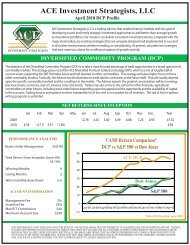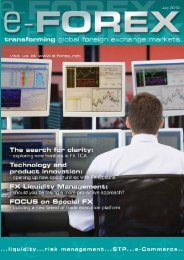You also want an ePaper? Increase the reach of your titles
YUMPU automatically turns print PDFs into web optimized ePapers that Google loves.
He says: “I think it has shown the world that the FX<br />
business is still relationship driven. Despite the<br />
increasing volumes of business being done<br />
electronically, clients still want a sales person at the end<br />
of the phone, therefore showing that voice single bank<br />
and multi bank platforms <strong>com</strong>pliment each other.” “In<br />
times of extreme crisis people always pick up the<br />
phone. The chat systems are also used extensively and<br />
are integrated into some platforms to keep that oneon-one<br />
relationship going.”<br />
Best execution<br />
The definition of best execution in foreign exchange<br />
trading goes beyond the notion of best price. Many<br />
buy-side firms define best execution in FX trading by<br />
looking at the total cost to execute, allocate, and<br />
settle an FX trade, including the potential for<br />
operational risk inherent in moving cash<br />
between accounts and counterparties.<br />
Cohen believes the two models will<br />
continue to exist side-by-side, simply<br />
because of the <strong>com</strong>pliance<br />
requirement for certain fund<br />
managers to get three quotes<br />
for every deal. However,<br />
banks are continuing to invest<br />
in the single bank platforms and<br />
Cohen says they continue to show growth.<br />
“Relationship-based pricing enables banks to tailor<br />
their services more specifically to individual client<br />
needs and offer value-added post-trade services, such<br />
as aggregation and straight-through-processing to the<br />
client’s front office booking systems as well as back<br />
office systems to enable automated allocations and<br />
providing online reporting tools,” he says.<br />
The recent crisis has put all the over-the-counter<br />
market instruments firmly in the spotlight. Cohen<br />
believes there has been greater focus on leverage in the<br />
retail space. In the US and Japan the tighter leverage<br />
regulations may have an impact on retail volumes<br />
further down the line, but Cohen says the single bank<br />
FX platforms are here to stay, due to the sheer<br />
volumes being traded on them, the resources that<br />
banks are putting into them and the fact that some<br />
clients prefer to trade on them.<br />
Going forward, Cohen says the banks will be<strong>com</strong>e<br />
more innovative to keep clients on their single bank<br />
platforms and this will take many different guises,<br />
from adding liquidity, better pricing models, more<br />
sophisticated execution models and algorithms, to<br />
adding more products, such as more exotic options.<br />
>>><br />
Andrew Cohen<br />
“Relationship-based pricing enables banks to tailor their<br />
services more specifically to individual client needs and offer<br />
value-added post-trade services...”<br />
Focus on relationships<br />
For Takis Spiropoulos, managing director and head of<br />
the e-Solutions group at CIBC World Markets, this<br />
innovation will be very much web-based, and the<br />
increased services that this enables banks to deliver<br />
will be a key <strong>com</strong>ponent in building single bank<br />
portals in the future. Spiropoulos says there has been<br />
a recent focus on client relationships across all asset<br />
classes, and the banks with strong balance sheets and<br />
high credit ratings were able to focus more on their<br />
relationships and saw an increase in market share.<br />
He says: “The events of the last year were a real<br />
testament to the importance of the relationships with<br />
clients. We saw a reduction in the number of bank<br />
counterparties, defaults and credit constraints, and as<br />
a result clients became more dependent upon fewer<br />
banks for liquidity provision and funding. For a<br />
number of primary dealers this presented<br />
opportunities to strengthen relationships with existing<br />
clients while opening the door to new clients in need<br />
of products that were challenging to hedge.”<br />
Spiropoulos believes that both FX ECNs and single<br />
bank portals will continue to grow, but at different<br />
rates, that are currency pair-dependant. The single<br />
bank portals maximise the internalisation of what is<br />
predominantly client flow for the more liquid G10<br />
currency pairs, but the banks rely upon ECNs to<br />
january 2010 e-FOREX | 29










